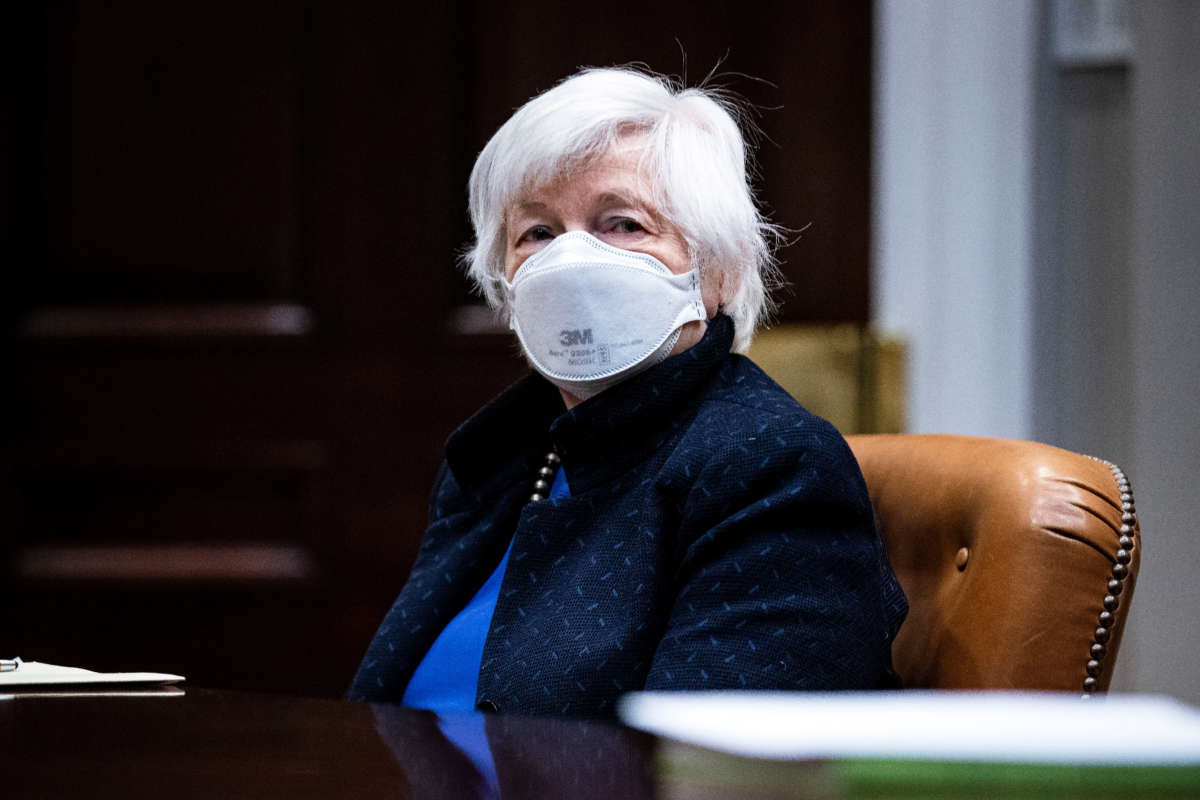As the Biden administration has been placing further scrutiny on wealthy and corporate taxpayers, Treasury Secretary Janet Yellen said on Tuesday that the government has missed out on $7 trillion in uncollected taxes over a decade.
“It’s really shocking and distressing to see estimates suggesting that the gap between what we’re collecting in taxes on current tax and what we should be collecting; if everybody were paying for taxes that are due, that amounts to over $7 trillion over a decade,” Yellen said during an economic summit held by The Atlantic.
If the Internal Revenue Service (IRS) were able to capture the entirety of the uncollected taxes, it would be enough to cover President Joe Biden’s recently proposed infrastructure plans, with money to spare.
Yellen has recently defended Biden’s strategy of spending alongside taxing the rich in his infrastructure packages, and recently told NBC, “We do need fiscal space to be able to address emergencies, like the one that we’ve been in with respect to the pandemic. We don’t want to use up all of that fiscal space and over the long run, deficits need to be contained to keep our federal finances on a sustainable basis. So, I believe that we should pay for these historic investments.”
Yellen’s comments roughly line up with other analyses of tax data. Head of the IRS Chris Rettig recently told the Senate Finance Committee that the U.S. misses out on as much as $1 trillion a year because of those who cheat on their taxes, and pinned the issue on a lack of funding and resources for the agency. The IRS’s enforcement division, Rettig said, has lost 17,000 employees over the past decade.
Studies have shown that rich and corporate tax evaders have hoarded a large share of the uncollected taxes, using sophisticated and complex techniques to hide their assets from the IRS. Analyses have shown that the top 1 percent of taxpayers avoid paying taxes on at least 21 percent of their income, according to IRS data.
Another analysis from March of 2019 data found that high-income earners making more than $1.5 million a year paid taxes on only 39 percent of their taxable income on average. The IRS collects less than 50 percent of the tax debt owed by high-income earners, the report found.
In all, the tax avoidance by the top 1 percent of earners — the vast majority of whom avoid being audited — could amount to over $5 trillion over a decade, according to a 2019 study co-authored by Lawrence Summers, former treasury secretary.
Corporations, meanwhile, hide their profits in offshore accounts and use abundant loopholes which sometimes allow them to dodge paying federal income taxes entirely. Under former President Donald Trump, corporations were given more freedom to earn profits abroad and stash the money overseas, making an already lax enforcement system for corporations even worse.
Meanwhile, domestically, large corporations like Amazon, Nike and FedEx have been able to avoid paying federal income taxes completely by exploiting loopholes in the tax code, which Budget Chairman Sen. Bernie Sanders (I-Vermont) has called “corrupt and rigged.”
Biden has recently been taking steps to fix the issue of wealthy and corporate tax dodging. Last week, it was reported that Biden is seeking an extra $80 billion for the IRS and granting extra authority to the agency in order to help crack down on tax dodgers to help pay for his infrastructure plans. Administration officials conservatively estimated that the effort would raise $780 billion over the next decade, though it could possibly be more.
Biden and other Democrats are also seeking to raise taxes on corporations and the wealthy to try to capture the runaway wealth of those groups, especially during the pandemic. “The choice is about who the economy serves,” Biden said on Monday. “I plan on giving tax breaks to the working-class folks and making everybody pay their fair share.”
Join us in defending the truth before it’s too late
The future of independent journalism is uncertain, and the consequences of losing it are too grave to ignore. To ensure Truthout remains safe, strong, and free, we need to raise $50,000 in the next 9 days. Every dollar raised goes directly toward the costs of producing news you can trust.
Please give what you can — because by supporting us with a tax-deductible donation, you’re not just preserving a source of news, you’re helping to safeguard what’s left of our democracy.
